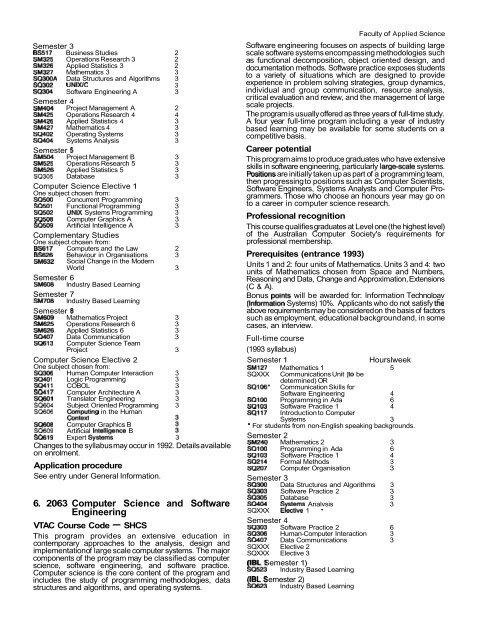1993 Swinburne Higher Education Handbook
1993 Swinburne Higher Education Handbook
1993 Swinburne Higher Education Handbook
Create successful ePaper yourself
Turn your PDF publications into a flip-book with our unique Google optimized e-Paper software.
Semester 3<br />
BS517 Business Studies 2<br />
SM325 Operations Research 3 2<br />
SM326 Applied Statistics 3 2<br />
SM327 Mathematics 3 3<br />
SQ300A Data Structures and Algorithms 3<br />
SQ302 UNlWC 3<br />
S0304 Software Engineering A 3<br />
Semester 4<br />
SM404 Project Management A 2<br />
SM425 Operations Research 4 4<br />
SM426 Applied Statistics 4 3<br />
SM427 Mathematics 4 3<br />
SQ402 Operating Systems 3<br />
SQ404 Systems Analysis 3<br />
Semester 5<br />
SM504 Project Management B 3<br />
SM525 Operations Research 5 3<br />
SM526 Applied Statistics 5 3<br />
SQ305 Database 3<br />
Computer Science Elective 1<br />
One subject chosen from:<br />
SQ500 Concurrent Programming 3<br />
SQ501 Functional Programming 3<br />
SQ502 UNlX Systems Programming 3<br />
SQ508 Computer Graphics A 3<br />
SQ509 Artificial Intelligence A 3<br />
Complementary Studies<br />
One subject chosen from:<br />
BS617 Computers and the Law 2<br />
BS626 Behaviour in Organisations 3<br />
SM632 Social Change in the Modern<br />
World 3<br />
Semester 6<br />
SM608 lndustry Based Learning<br />
Semester 7<br />
SM708 lndustry Based Learning<br />
Semester 8<br />
SM609 Mathematics Project 3<br />
SM625 Operations Research 6 3<br />
SM626 Applied Statistics 6 3<br />
SQ407 Data Communication 3<br />
SQ613 Computer Science Team<br />
Project 3<br />
Computer Science Elective 2<br />
One subject chosen from:<br />
SQ306 Human Computer Interaction 3<br />
SQ401 Logic Programming 3<br />
SQ411 COBOL 3<br />
-17 Computer Architecture A 3<br />
SQ601 Translator Engineering 3<br />
SQ604 Subject Oriented Programming 3<br />
SQ606 Com~utina in the Human<br />
Context -<br />
SQ608 Computer Graphics B<br />
SQ609 Artificial lntelliaence B<br />
SO619 Expert Systems 3<br />
Changes to the syllabus may occur in 1992. Details available<br />
on enrolment.<br />
Application procedure<br />
See entry under General Information.<br />
6. 2063 Computer Science and Software<br />
Engineering<br />
VTAC Course Code - SHCS<br />
This program provides an extensive education in<br />
contemporary approaches to the analysis, design and<br />
implementation of large scale computer systems. The major<br />
components of the program may be classified as computer<br />
science, software engineering, and software practice.<br />
Computer science is the core content of the program and<br />
includes the study of programming methodologies, data<br />
structures and algorithms, and operating systems.<br />
Faculty of Applied Science<br />
Software engineering focuses on aspects of building large<br />
scale software systems encompassing methodologies such<br />
as functional decomposition, object oriented design, and<br />
documentation methods. Software practice exposes students<br />
to a variety of situations which are designed to provide<br />
experience in problem solving strategies, group dynamics,<br />
individual and group communication, resource analysis,<br />
critical evaluation and review, and the management of large<br />
scale projects.<br />
The program is usually offered as three years of full-time study.<br />
A four year full-time program including a year of industry<br />
based learning may be available for some students on a<br />
competitive basis.<br />
Career potential<br />
This program aims to produce graduates who have extensive<br />
skills in software engineering, particularly largescale systems.<br />
Positions are initially taken up as part of a programming team,<br />
then progressing to positions such as Computer Scientists,<br />
Software Engineers, Systems Analysts and Computer Programmers.<br />
Those who choose an honours year may go on<br />
to a career in computer science research.<br />
Professional recognition<br />
This course qualifies graduates at Level one (the highest level)<br />
of the Australian Computer Society's requirements for<br />
professional membership.<br />
Prerequisites (entrance <strong>1993</strong>)<br />
Units 1 and 2: four units of Mathematics. Units 3 and 4: two<br />
units of Mathematics chosen from Space and Numbers,<br />
Reasoning and Data, Change and Approximation, Extensions<br />
(C & A).<br />
Bonus ~oints will be awarded for: lnformation Technoloav<br />
(lnformation Systems) 10%. Applicants who do not satisfy the<br />
above requirements may be considered on the basis of factors<br />
such as employment, educational background and, in some<br />
cases, an interview.<br />
Full-time course<br />
(<strong>1993</strong> syllabus)<br />
Semester 1<br />
Hourslweek<br />
SM127 Mathematics 1 5<br />
SQXXX Communications Unit (to be<br />
determined) OR<br />
SQ106' Communication Skills for<br />
Software Engineering 4<br />
SQ1W Programming in Ada 6<br />
SQ103 Software Practice 1 4<br />
SQ117 Introduction to Computer<br />
Systems 3<br />
For students from non-English speaking backgrounds.<br />
Semester 2<br />
SM240 Mathematics 2 3<br />
SQlOO Programming in Ada 6<br />
SQ103 Software Practice 1 4<br />
SQ214 Formal Methods 3<br />
SQ207 Computer Organisation 3<br />
Semester 3<br />
SQ300 Data Structures and Algorithms 3<br />
SQ303 Software Practice 2 3<br />
SQ305 Database 3<br />
SQ404 Svstems Analvsis 3<br />
SQXXX ~iective 1 '<br />
Semester 4<br />
SQ303 Software Practice 2 6<br />
SQ306 Human-Computer Interaction 3<br />
SQ407 Data Communications 3<br />
SQXXX Elective 2<br />
SQXXX Elective 3<br />
IBL Semester 1)<br />
bQ523 lndustry Based Learning<br />
IBL Semester 2)<br />
h 2 3 Industry Based Learning

















